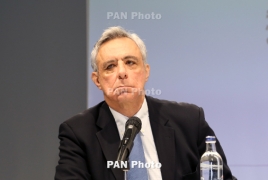
Former Foreign Minister Vartan Oskanian wrote on Facebook that Prime Minister Nikol Pashinyan still has the opportunity to leave power peacefully, by “accepting that he has merely proven to be unprepared and incapable, while simultaneously recognizing the inevitability of being held accountable under the law.”
He also said that Pashinyan was brought to power by the people, who now have the ability to correct their mistake.
“I want to offer my straightforward and honest understanding. First, I have no doubt that Nikol Pashinyan came to power by the will of the people. The theories circulated for years suggesting that powerful third-party forces were behind him, that the events were a conspiracy, are, in my deep conviction, disconnected from reality. This belief comes from my years of working with so-called ‘third forces’ at various levels. The world doesn’t work like that. While it’s undeniable that various powers have interests in our region, this doesn’t mean they united, chose Pashinyan, made him a revolutionary leader, and are keeping him in power. This unrealistic theory wrongly elevates his importance. He came to power through the people, and it is the people who can fix their mistake.
Therefore, it’s also clear to me that Pashinyan, who rode a wave of public trust into power, had neither the desire nor the plan to bring the country to this state. On the contrary, I believe he wanted to achieve successes that would overshadow those of previous administrations. The myth that he was installed by certain powers to surrender Artsakh, weaken Armenia, or divide it, is also detached from reality. This conclusion is again based on my diplomatic experience. In 2018, Pashinyan was simply unprepared to lead a state in such a complex region. He was inexperienced, uninformed, inept, lacking knowledge of international relations, and overly self-confident. He failed for these reasons alone. Searching for conspiracies is pointless and unproductive,” Oskanian wrote.
He believes Pashinyan is now fully aware that his ignorance and incompetence have led to a situation with grave consequences for Armenia and its people.
“It was unacceptable that after the war, instead of stepping down, he entered a phase of self-justification, constantly trying to ‘explain’ the events with ‘innovative’ ideas. This is essentially a trap and a vicious cycle that he has thrown himself into. The fact that nearly everything he says aligns with Azerbaijan’s interests, in my view, is not a conspiracy but a result of that cycle. Under his governance, Armenia’s national interests have become so unprotected that, not knowing how to defend them, Pashinyan is forced to invent justifications pretending that what’s happening is the only viable option,” the post reads.
Oskanian argued that Pashinyan cannot correct the situation because he lacks the knowledge and ability to do so. In his opinion, Pashinyan’s continued rhetoric of self-justification will only make Armenia more vulnerable and lead to irreversible losses.
“This means that alongside external threats and pressure from Azerbaijan, Armenia now also faces the danger of continued power usurpation and serious civil conflict. The only way to avoid this is to make leaving office a more acceptable option for Pashinyan than turning it into a ‘life or death’ issue,” he stated.
According to Oskanian, Pashinyan must step down because he lacks both the ability to govern and external support.
“He does not understand the responsibility of his role, has not learned or grown in the past seven years, and shows signs of erratic behavior. He cannot listen, fails to grasp the weight and importance of speech in politics and diplomacy, and as a result poses a serious threat to Armenia’s security, development, welfare, and national unity.
Today, Pashinyan still has a peaceful way out—by accepting that he has proven himself unprepared and incapable, while recognizing the inevitability of legal accountability. The opposition must also accept this path, because any other outcome will become a ‘life and death’ dilemma, increasing Pashinyan’s temptation to cling to power and raising the risk of internal conflict,” Oskanian wrote.

